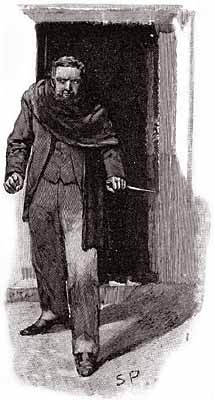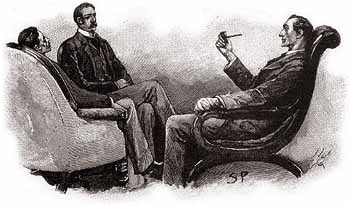| The Naval Treaty 14 | The Final Problem 1 |
“The night was fine, but still it was a very weary vigil. Of course it has the sort of excitement about it that the sportsman feels when he lies beside the watercourse and waits for the big game. It was very long, though – almost as long, Watson, as when you and I waited in that deadly room when we looked into the little problem of the Speckled Band. There was a church-clock down at Woking which struck the quarters, and I thought more than once that it had stopped. At last, however, about two in the morning, I suddenly heard the gentle sound of a bolt being pushed back and the creaking of a key. A moment later the servants’ door was opened, and Mr. Joseph Harrison stepped out into the moonlight.”

“Joseph!” ejaculated Phelps.
“He was bare-headed, but he had a black cloak thrown over his shoulder, so that he could conceal his face in an instant if there were any alarm. He walked on tiptoe under the shadow of the wall, and when he reached the window he worked a long-bladed knife through the sash and pushed back the catch. Then he flung open the window, and putting his knife through the crack in the shutters, he thrust the bar up and swung them open.
“From where I lay I had a perfect view of the inside of the room and of every one of his movements. He lit the two candles which stood upon the mantelpiece, and then he proceeded to turn back the corner of the carpet in the neighbourhood of the door. Presently he stooped and picked out a square piece of board, such as is usually left to enable plumbers to get at the joints of the gas-pipes. This one covered, as a matter of fact, the T joint which gives off the pipe which supplies the kitchen underneath. Out of this hiding-place he drew that little cylinder of paper, pushed down the board, rearranged the carpet, blew out the candles, and walked straight into my arms as I stood waiting for him outside the window.
“Well, he has rather more viciousness than I gave him credit for, has Master Joseph. He flew at me with his knife, and I had to grasp him twice, and got a cut over the knuckles, before I had the upper hand of him. He looked murder out of the only eye he could see with when we had finished, but he listened to reason and gave up the papers. Having got them I let my man go, but I wired full particulars to Forbes this morning. If he is quick enough to catch his bird, well and good. But if, as I shrewdly suspect, he finds the nest empty before he gets there, why, all the better for the government. I fancy that Lord Holdhurst, for one, and Mr. Percy Phelps for another, would very much rather that the affair never got as far as a police-court.”
“My God!” gasped our client. “Do you tell me that during these long ten weeks of agony the stolen papers were within the very room with me all the time?”
“So it was.”
“And Joseph! Joseph a villain and a thief!”
“Hum! I am afraid Joseph’s character is a rather deeper and more dangerous one than one might judge from his appearance. From what I have heard from him this morning, I gather that he has lost heavily in dabbling with stocks, and that he is ready to do anything on earth to better his fortunes. Being an absolutely selfish man, when a chance presents itself he did not allow either his sister’s happiness or your reputation to hold his hand.”
Percy Phelps sank back in his chair. “My head whirls,” said he. “Your words have dazed me.”
“The principal difficulty in your case,” remarked Holmes in his didactic fashion, “lay in the fact of there being too much evidence. What was vital was overlaid and hidden by what was irrelevant. Of all the facts which were presented to us we had to pick just those which we deemed to be essential, and then piece them together in their order, so as to reconstruct this very remarkable chain of events. I had already begun to suspect Joseph from the fact that you had intended to travel home with him that night, and that therefore it was a likely enough thing that he should call for you, knowing the Foreign Office well, upon his way. When I heard that someone had been so anxious to get into the bedroom, in which no one but Joseph could have concealed anything – you told us in your narrative how you had turned Joseph out when you arrived with the doctor – my suspicions all changed to certainties, especially as the attempt was made on the first night upon which the nurse was absent, showing that the intruder was well acquainted with the ways of the house.”
“How blind I have been!”
“The facts of the case, as far as I have worked them out, are these: This Joseph Harrison entered the office through the Charles Street door, and knowing his way he walked straight into your room the instant after you left it. Finding no one there he promptly rang the bell, and at the instant that he did so his eyes caught the paper upon the table. A glance showed him that chance had put in his way a State document of immense value, and in an instant he had thrust it into his pocket and was gone. A few minutes elapsed, as you remember, before the sleepy commissionaire drew your attention to the bell, and those were just enough to give the thief time to make his escape.
“He made his way to Woking by the first train, and, having examined his booty and assured himself that it really was of immense value, he had concealed it in what he thought was a very safe place, with the intention of taking it out again in a day or two, and carrying it to the French embassy, or wherever he thought that a long price was to be had. Then came your sudden return. He, without a moment’s warning, was bundled out of his room, and from that time onward there were always at least two of you there to prevent him from regaining his treasure. The situation to him must have been a maddening one. But at last he thought he saw his chance. He tried to steal in, but was baffled by your wakefulness. You may remember that you did not take your usual draught that night.”
“I remember.”
“I fancy that he had taken steps to make that draught efficacious, and that he quite relied upon your being unconscious. Of course, I understood that he would repeat the attempt whenever it could be done with safety. Your leaving the room gave him the chance he wanted. I kept Miss Harrison in it all day so that he might not anticipate us. Then, having given him the idea that the coast was clear, I kept guard as I have described. I already knew that the papers were probably in the room, but I had no desire to rip up all the planking and skirting in search of them. I let him take them, therefore, from the hiding-place, and so saved myself an infinity of trouble. Is there any other point which I can make clear?”

“Why did he try the window on the first occasion,” I asked, “when he might have entered by the door?”
“In reaching the door he would have to pass seven bedrooms. On the other hand, he could get out on to the lawn with ease. Anything else?”
“You do not think,” asked Phelps, “that he had any murderous intention? The knife was only meant as a tool.”
“It may be so,” answered Holmes, shrugging his shoulders. “I can only say for certain that Mr. Joseph Harrison is a gentleman to whose mercy I should be extremely unwilling to trust.”
| The Naval Treaty 14 | The Final Problem 1 |